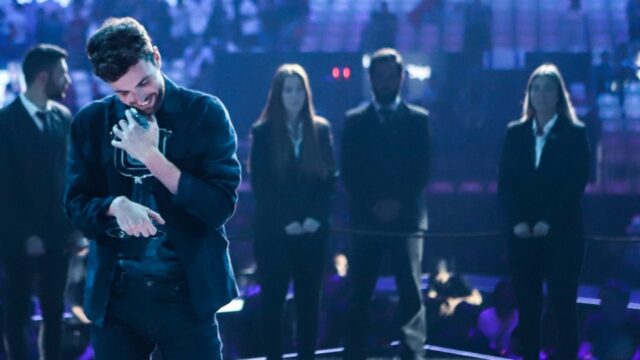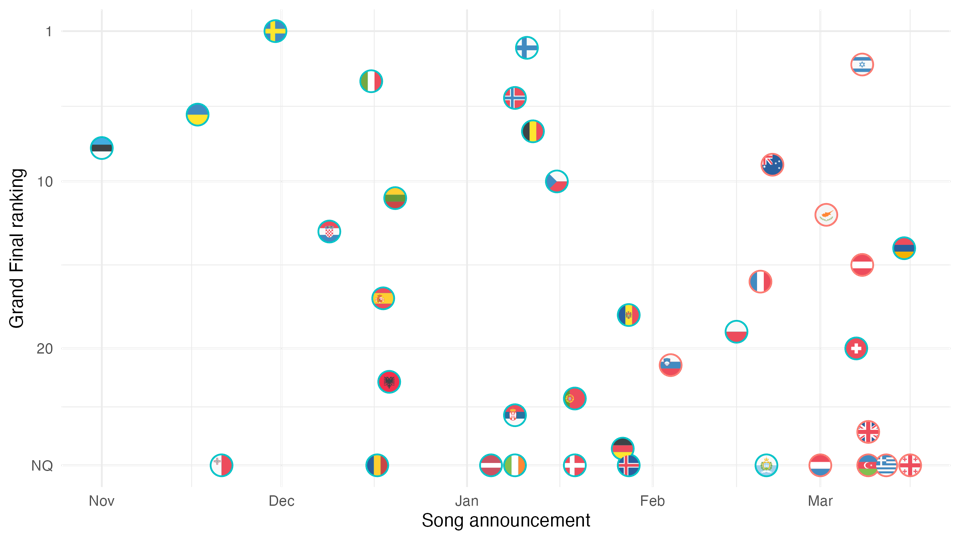Today is September 1st. The birthday of Gloria Estefan, Barry Gibb, and Engelbert Humperdinck (the German composer born in 1854, not the United Kingdom’s 2012 entry in Baku); the anniversary of songwriter Hal David’s death, and a day that strikes fear into anyone working in a school.
It’s also the start of the modern Eurovision Song Contest season.
Surely that means it’s time to get excited? Any song that’s released commercially from today onwards is eligible for next year’s competition in Malmö. Any day now, we could theoretically hear the winning song which could be heard again through tears as its singer lifts the trophy in May.
Will we?
What Do You Want To Know About?
To figure out how excited we should be getting at this stage, let’s look at last year’s calendar. For each of the 2023 entries, there are three main dates of interest.
The first is the date on which it’s announced that a performer is under consideration for the contest: when this happens, enthusiasts might fire up their streaming service of choice and reflect on how suitable they think a performer’s back catalogue might be for the Context.
The second is the date on which it’s announced what song or songs are under consideration. At this point, fans aren’t just thinking hypothetically about what kind of entry a performer might be submitting: they can reflect on the particular song itself.
Finally, there’s the date on which it’s confirmed which song each country will be sending to the the Eurovision Song Contest.
Of course, for some delegations, all three of those dates are the same. This is true for the majority of internal selections, although not all of them; it was announced that Noa Kirel would be competing for Israel in August of last year, before what we consider the start of Eurovision season. We didn’t hear that she’d be performing Unicorn until March. This isn’t a one-off: on Wednesday, we heard that Mustii would be representing Belgium in Malmö 2024, but who knows when we’ll hear which song he’ll be singing?
When Do We Hear About Who Wins?
If not September 1st, when should we start getting excited? Let’s start with a recap of the rhythm leading up to Liverpool, by looking at the dates when different national delegations confirm both the artist and songs they’d be sending. Countries that used a competitive process are highlighted in blue; those with internal selections are in pink.
If you’re only interested in listening to acts that are definitely off to Malmö Arena, it’s probably not time to get excited just yet: there’s a lot of white space on the left-hand side of this graph. Only two entries for Liverpool 2023 were confirmed in 2022, and only two more before the start of February; at which point the pace picked up considerably.
But if you want to know who might be representing each country, maybe things will pick up more quickly? Let’s have a look.
September is still a ghost town. Again, Noa Kirel was very early, but then more than two months passed before we knew about our second competitor in Liverpool in the shape of Andrew Lambrou. After those two (other than Mia Nicolai and Dion Cooper), the majority of names we heard about were from announcements they’d be participating in National Selections.
It’s The Songs That Matter
But most people don’t want to hear about just the acts’ names that might be competing in the Song Contest; at what point did we start hearing announcements of songs that were likely to compete and produce a strong result in Liverpool, be they internal selections or National Finals? To answer that question, we can look at both when songs were announced – but necessarily published – and their eventual performance in the Grand Final.
The first song we heard about was Alika’s Bridges – the Estonians get moving on their National Selection early on. Next was Tvorchi’s ‘Heart of Steel’. So the first two songs we heard that ended up making it to Liverpool both ranked in the Top 10 in the Grand Final. Yet following that was The Busker’s ‘Dance (Our Own Party)’, which came in last place in its first Semi Final. This shows us that being one of the first songs to become known to fans is no guarantee of success.
After that, it’s a real mix. While the majority of the Top 10 were first heard before the middle of January 2023, we didn’t hear third-placed ‘Unicorn’ until March.
Patterns From History
This year is just one year. Maybe 2023 was unusual, and we usually hear from the frontrunners far sooner?
We can check this by looking at the other two contests since the start of the pandemic. As we’re just curious about the frontrunners, let’s focus just on the top 3s in both years. 2021 was an unusual contest as several performers who’d been scheduled to participate in 2020 had their appearance in Rotterdam re-confirmed, so let’s – once again, look at the time of year that we heard about the songs for the first time. This time, the 2021 entries are highlighted in black, and the 2022 entries are in green.
In neither year did we hear about any of the eventual top 3 until December, and the two songs that came through their national internal selection processes (from Gjon’s Tears and Sam Ryder) weren’t heard until early March in their respective years: just over two months before they’d be heard in their respective Grand Finals.
When Can We Party?
So should you be getting excited today? Well… I’m always getting excited by Eurovision!
If 2024 is anything like 2023 (or the preceding two contests), we’ll hear most of the Top 10 before the middle of January, but we won’t hear any of it before November. When the nights draw in, and the clocks go back for winter, that’s when you should start to pay attention.














